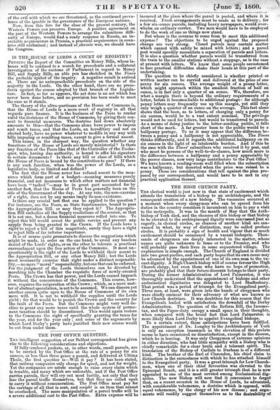IS THE;HOUSE OF LORDS A COURT OF REGISTRY? PEEDDTG the
Report of the Committee on Money Bills, whose la- bours will be confined to a search for precedents and a collateral investigation of the customs of Parliament in regard to Money Bill, and Supply Bills, an able pen has sketched in the Times the probable upshot of the inquiry. A negative result is arrived at. There are no unimpeachable precedents on the side of the majority in the Lords. On the other hand, there are no prece- dents against the course adopted by that branch of the Legisla- ture. In fact, so far as appears, the act done is an act which has never been done before, and no provision has been made to meet the case as it stands.
The theory of the ultra-partisans of the House of Commons is, that the House of Lords is a mere court of registry in all that regards pure finance. It is the business of the Peers to render valid the decisions of the House of Commons, by giving their con- sent to financial measures. The doctrine laid down absolutely amounts to this—that the Commons alone have power to impose and remit taxes, and that the Lords, an hereditary and not an elected body, have no power whatever to meddle in any way with bills imposing or remitting taxes, except to give a formal assent. This raises, in the sharpest way, the question whether any functions of the House of Lords are merely ministerial ? Is there any function of the Peers like that of the Controller of the Exche- quer, who, having due authority, is bound to affix his signature to certain documents ? Is there any bill or class of bills which the House of Peers in bound by the constitution to pass? If there is any such function when was the power of the Lords, as a legislative body, so limited and defined ? The fact that the House never has refused assent to the mea- sures which form part of a budget—meaning measures purely financial, and not measures to which other matters not financial have been "tacked "—may be in great part accounted for by another fact, that the House of Peers has generally been on the side of the Government of the day. At any rate, the non-exercise of a right, does not by any means imply its non-existence.
Is there any crucial test that can be applied to the question ? For instance, are the Peers, as State functionaries, bound to pass the Appropriation Bill, or may they reject it? The Appropria- tion Bill embodies all the Supply resolutions of the session, so that it is not one, but a dozen financial measures rolled into one. To reject this bill would arrest the public service and prevent any supply from being granted to the Crown. If the Lords have a right-to reject a bill of this magnitude, surely they have a right to reject bills of far inferior importance. It IF of course quite premature to discuss the suggestions which might be made, in order on the one hand, to avoid any baseless denial of the Lords' rights, or on the other to tolerate a practical encroachment upon the free action of the Commons. It most un- questionably is the right of the Lords to withhold their assent to the Appropriation Bill, or any other Money Bill ; but the Lords must necessarily exercise that right under a distinct responsibi- lity,—no mere " moral " responsibility, but one that can be enforced. For the judgment of the Lords themselves can be diverted by marching into the Chamber the requisite force of newly-created Peers. The Crown has that power, and the Lords cannot impeach it without the concurrence of the Commons. This course, how- ever, requires the cooperation of the Crown ; which, as a mere mat- ter of abstract speculation, is not to be assumed. We can discern yet another course quite open to the House of Commons of its own mere will. It is not to withhold the supplies until the Lords yield ; for that would be to punish the Crown and the country for the fault of the Peers. But the Commons might very well de- cline to grant any more taxes until the whole system of perma- nent taxation should be discontinued. This would again restore to the Commons the right of specifically granting the taxes for the year, and for the year only ; and some of the arguments by which Lord Derby's party have justified their new course would be cut from under them.


























 Previous page
Previous page